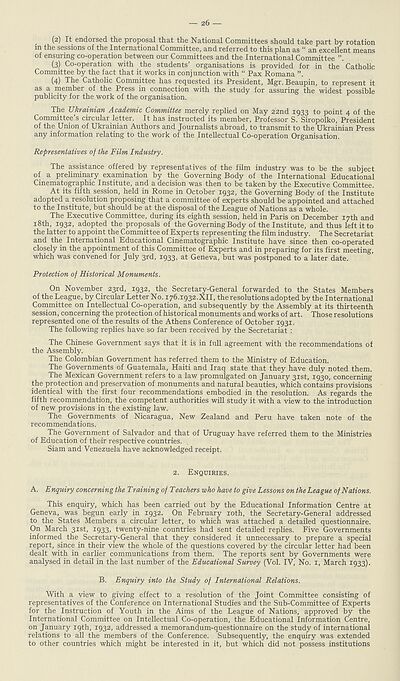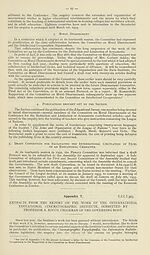International > Report by the committee on the work of its ... plenary session > Fifteenth plenary session
(26)
Download files
Complete book:
Individual page:
Thumbnail gallery: Grid view | List view

— 26
(2) It endoised the proposal that the National Committees should take part by rotation
in the sessions of the International Committee, and referred to this plan as ct an excellent means
of ensuring co-operation between our Committees and the International Committee
(3) Co-operation with the students’ organisations is provided for in the Catholic
Committee by the fact that it works in conjunction with “ Pax Romana
(4) The Catholic Committee has requested its President, Mgr. Beaupin, to represent it
as a member of the Press in connection with the study for assuring the widest possible
publicity for the work of the organisation.
The Ukrainian Academic Committee merely replied on May 22nd 1933 to point 4 of the
Committee s circular letter. It has instructed its member, Professor S. Siropolko, President
of the Union of Ukrainian Authors and Journalists abroad, to transmit to the Ukrainian Press
any information relating to the work of the Intellectual Co-operation Organisation.
Representatives of the Film Industry.
The assistance offered by representatives of the film industry was to be the subject
of a preliminary examination by the Governing Body of the International Educational
Cinematographic Institute, and a decision was then to be taken by the Executive Committee.
At its fifth session, held in Rome in October 1932, the Governing Body of the Institute
adopted a resolution proposing that a committee of experts should be appointed and attached
to the Institute, but should be at the disposal of the League of Nations as a whole.
The Executive Committee, during its eighth session, held in Paris on December 17th and
18th, 1932, adopted the proposals of the Governing Body of the Institute, and thus left it to
the latter to appoint the Committee of Experts representing the film industry. The Secretariat
and the International Educational Cinematographic Institute have since then co-operated
closely in the appointment of this Committee of Experts and in preparing for its first meeting,
which was convened for July 3rd, 1933, at Geneva, but was postponed to a later date.
Protection of Historical Monuments.
On November 23rd, 1932, the Secretary-General forwarded to the States Members
of the League, by Circular Letter No. 176.1932.XII, the resolutions adopted by the International
Committee on Intellectual Co-operation, and subsequently by the Assembly at its thirteenth
session, concerning the protection of historical monuments and works of art. Those resolutions
represented one of the results of the Athens Conference of October 1931.
The following replies have so far been received by the Secretariat :
The Chinese Government says that it is in full agreement with the recommendations of
the Assembly.
The Colombian Government has referred them to the Ministry of Education.
The Governments of Guatemala, Haiti and Iraq state that they have duly noted them.
The Mexican Government refers to a law promulgated on January 31st, 1930, concerning
the protection and preservation of monuments and natural beauties, which contains provisions
identical with the first four recommendations embodied in the resolution. As regards the
fifth recommendation, the competent authorities will study it with a view to the introduction
of new provisions in the existing law.
The Governments of Nicaragua, New Zealand and Peru have taken note of the
recommendations.
The Government of Salvador and that of Uruguay have referred them to the Ministries
of Education of their respective countries.
Siam and Venezuela have acknowledged receipt.
2. Enquiries.
A. Enquiry concerning the Training of Teachers who have to give Lessons on the League of Nations.
This enquiry, which has been carried out by the Educational Information Centre at
Geneva, was begun early in 1932. On February 10th, the Secretary-General addressed
to the States Members a circular letter, to which was attached a detailed questionnaire.
On March 31st, 1933, twenty-nine countries had sent detailed replies. Five Governments
informed the Secretary-General that they considered it unnecessary to prepare a special
report, since in their view the whole of the questions covered by the circular letter had been
dealt with in earlier communications from them. The reports sent by Governments were
analysed in detail in the last number of the Educational Survey (Vol. IV, No. 1, March 1933).
B. Enquiry into the Study of International Relations.
With a view to giving effect to a resolution of the Joint Committee consisting of
representatives of the Conference on International Studies and the Sub-Committee of Experts
for the Instruction of Youth in the Aims of the League of Nations, approved by the
International Committee on Intellectual Co-operation, the Educational Information Centre,
on January 19th, 1932, addressed a memorandum-questionnaire on the study of international
relations to all the members of the Conference. Subsequently, the enquiry was extended
to other countries which might be interested in it, but which did not possess institutions
(2) It endoised the proposal that the National Committees should take part by rotation
in the sessions of the International Committee, and referred to this plan as ct an excellent means
of ensuring co-operation between our Committees and the International Committee
(3) Co-operation with the students’ organisations is provided for in the Catholic
Committee by the fact that it works in conjunction with “ Pax Romana
(4) The Catholic Committee has requested its President, Mgr. Beaupin, to represent it
as a member of the Press in connection with the study for assuring the widest possible
publicity for the work of the organisation.
The Ukrainian Academic Committee merely replied on May 22nd 1933 to point 4 of the
Committee s circular letter. It has instructed its member, Professor S. Siropolko, President
of the Union of Ukrainian Authors and Journalists abroad, to transmit to the Ukrainian Press
any information relating to the work of the Intellectual Co-operation Organisation.
Representatives of the Film Industry.
The assistance offered by representatives of the film industry was to be the subject
of a preliminary examination by the Governing Body of the International Educational
Cinematographic Institute, and a decision was then to be taken by the Executive Committee.
At its fifth session, held in Rome in October 1932, the Governing Body of the Institute
adopted a resolution proposing that a committee of experts should be appointed and attached
to the Institute, but should be at the disposal of the League of Nations as a whole.
The Executive Committee, during its eighth session, held in Paris on December 17th and
18th, 1932, adopted the proposals of the Governing Body of the Institute, and thus left it to
the latter to appoint the Committee of Experts representing the film industry. The Secretariat
and the International Educational Cinematographic Institute have since then co-operated
closely in the appointment of this Committee of Experts and in preparing for its first meeting,
which was convened for July 3rd, 1933, at Geneva, but was postponed to a later date.
Protection of Historical Monuments.
On November 23rd, 1932, the Secretary-General forwarded to the States Members
of the League, by Circular Letter No. 176.1932.XII, the resolutions adopted by the International
Committee on Intellectual Co-operation, and subsequently by the Assembly at its thirteenth
session, concerning the protection of historical monuments and works of art. Those resolutions
represented one of the results of the Athens Conference of October 1931.
The following replies have so far been received by the Secretariat :
The Chinese Government says that it is in full agreement with the recommendations of
the Assembly.
The Colombian Government has referred them to the Ministry of Education.
The Governments of Guatemala, Haiti and Iraq state that they have duly noted them.
The Mexican Government refers to a law promulgated on January 31st, 1930, concerning
the protection and preservation of monuments and natural beauties, which contains provisions
identical with the first four recommendations embodied in the resolution. As regards the
fifth recommendation, the competent authorities will study it with a view to the introduction
of new provisions in the existing law.
The Governments of Nicaragua, New Zealand and Peru have taken note of the
recommendations.
The Government of Salvador and that of Uruguay have referred them to the Ministries
of Education of their respective countries.
Siam and Venezuela have acknowledged receipt.
2. Enquiries.
A. Enquiry concerning the Training of Teachers who have to give Lessons on the League of Nations.
This enquiry, which has been carried out by the Educational Information Centre at
Geneva, was begun early in 1932. On February 10th, the Secretary-General addressed
to the States Members a circular letter, to which was attached a detailed questionnaire.
On March 31st, 1933, twenty-nine countries had sent detailed replies. Five Governments
informed the Secretary-General that they considered it unnecessary to prepare a special
report, since in their view the whole of the questions covered by the circular letter had been
dealt with in earlier communications from them. The reports sent by Governments were
analysed in detail in the last number of the Educational Survey (Vol. IV, No. 1, March 1933).
B. Enquiry into the Study of International Relations.
With a view to giving effect to a resolution of the Joint Committee consisting of
representatives of the Conference on International Studies and the Sub-Committee of Experts
for the Instruction of Youth in the Aims of the League of Nations, approved by the
International Committee on Intellectual Co-operation, the Educational Information Centre,
on January 19th, 1932, addressed a memorandum-questionnaire on the study of international
relations to all the members of the Conference. Subsequently, the enquiry was extended
to other countries which might be interested in it, but which did not possess institutions
Set display mode to:
![]() Universal Viewer |
Universal Viewer | ![]() Mirador |
Large image | Transcription
Mirador |
Large image | Transcription
Images and transcriptions on this page, including medium image downloads, may be used under the Creative Commons Attribution 4.0 International Licence unless otherwise stated. ![]()
| League of Nations > International > Report by the committee on the work of its ... plenary session > Fifteenth plenary session > (26) |
|---|
| Permanent URL | https://digital.nls.uk/195324641 |
|---|
| Attribution and copyright: |
|
|---|---|
| Shelfmark | LN.XII.5 |
|---|---|
| Shelfmark | LN.XII |
|---|
| Description | Over 1,200 documents from the non-political organs of the League of Nations that dealt with health, disarmament, economic and financial matters for the duration of the League (1919-1945). Also online are statistical bulletins, essential facts, and an overview of the League by the first Secretary General, Sir Eric Drummond. These items are part of the Official Publications collection at the National Library of Scotland. |
|---|---|
| Additional NLS resources: |
|

